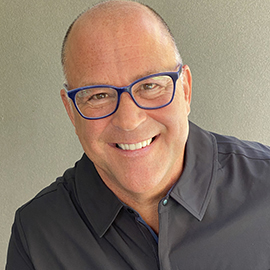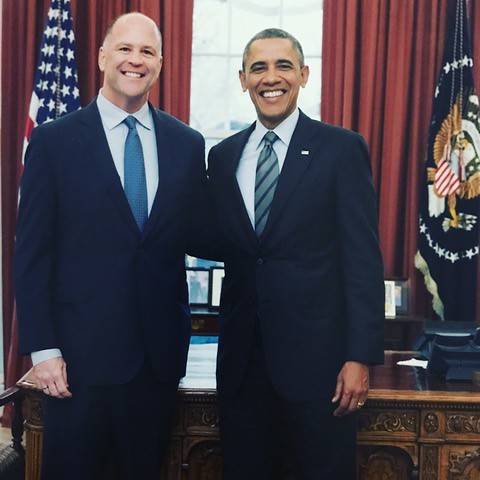SPOTLIGHT: Jerry White
 Jerry White (EMBA 2005) is an award-winning social entrepreneur, author, and humanitarian activist known for conducting high-impact campaigns – three of which led to major international treaties, including the Landmine Ban Treaty and the U.N. Convention on the Rights of Persons with Disabilities. He shared the 1997 Nobel Prize for Peace awarded to the International Campaign to Ban Landmines. He is a Professor of Practice at the University of Virginia teaching a popular class on Religion, Violence, and Strategy: How to Stop Killing in the Name of God. Jerry Davis of Business+Impact caught up with Mr. White this summer over Zoom, where they discussed wide-ranging subjects from personal triumph to business instruction in an age of radical disruption. Below is a portion of their interview.
Jerry White (EMBA 2005) is an award-winning social entrepreneur, author, and humanitarian activist known for conducting high-impact campaigns – three of which led to major international treaties, including the Landmine Ban Treaty and the U.N. Convention on the Rights of Persons with Disabilities. He shared the 1997 Nobel Prize for Peace awarded to the International Campaign to Ban Landmines. He is a Professor of Practice at the University of Virginia teaching a popular class on Religion, Violence, and Strategy: How to Stop Killing in the Name of God. Jerry Davis of Business+Impact caught up with Mr. White this summer over Zoom, where they discussed wide-ranging subjects from personal triumph to business instruction in an age of radical disruption. Below is a portion of their interview.
What have you learned over the time you’ve been an entrepreneur?
My greatest influence has come from working in coalition. Impact is collective and requires shared leadership across many disciplines. Personally, I prefer to remain outside government systems, while joining forces with private and public partners to regenerate the planet.
“Transpreneurship” is a concept I teach a rising generation of leaders to understand how to advance sustainable system innovation. How do we promote collective flourishing? Our young entrepreneurs and graduates need to be trained to lead across sectors. To effect lasting transformation, they have to leverage multiple stakeholders in government (.gov), civil society (.org), universities (.edu), and business (.com).
When I was getting my MBA last century, I wondered how few business executives seemed to grasp the power of civil society movements and the shaping of public policy. Our “nonprofit industrial complex” is a trillion-dollar industry, from philanthropy to education and hospitals and community service – affecting all our lives. Business education doesn’t teach much about building cross-sector strategies that tap into the power of values and volunteerism characteristic of the United States since our founding.
How does one discover their personal G.P.S.?
Keep asking questions:
- Do you have an affirmative vision for life, for leadership, for people and the planet? They aren’t just words on a Post-It or on a U.N. SDG or corporate ESG scorecard. There has to be something very real and positive underpinning our work. Negativity, cynicism, and opposition are not visionary, nor strategic. Nor are “counter-terrorism” or “war against drugs” or even a “war against Covid.” Fundamental questions: Who Are You Really? What Do You Stand For? Why Are You Here?
- Do you know what you’re not going to do? This is one of the simple lessons from the Ross School – the power of making wise choices faster. It was the first time I heard someone say, “Strategy is as much about what you’re not going to do as what you envision for corporate action.” If you’re trying to do too much, to be all things to all markets, you will flail and fail.
- What can you contribute with excellence? If you don’t know yourself, including your gifts and skillsets, it’s questionable whether you’re actually prepared for leadership. Having “a teachable point of view,” as we learned at Ross, is vital for becoming a game-changer who grows teams and shares the wisdom of a higher purpose.
Transformational leaders align three things: I call them Wisdom, Understanding, and Knowledge. Call them whatever you like, whether Value-set, Mindset, and Skillset; or Awareness, Advocacy, and Action; even “Mind-Body-Spirit.” Just make sure these three essential layers align who you are, why you seek change, and what you do well, day to day. And voila!

Who are some of the best strategic leaders in your view?
So many Forrest Gump-like names come to mind. These days, I look for “minidelas” rather than waiting for another great Mandela. We the People must be the transformation we seek. Transpreneurs who transcend ego with social, emotional, and spiritual intelligence can work nimbly across multiple sectors and disciplines. These are a blend of Entrepreneurs, Intrapreneurs, Interpreneurs, and Innerpreneurs. Most students are familiar with the first two, so I’ll touch upon the latter: By “Interpreneurs,” I mean building unusual coalitions like we did in the landmine and disability rights campaigns – mobilizing over a thousand organizations with diverse leadership in more than 150 countries. In effect, we created a cross-border civil society superpower to negotiate the Mine Ban Treaty in record time, recognized by the Nobel Prize in 1997.
Often the missing piece is what we call “Innerpreneurship” – having a clear moral compass and spiritual discipline to go the distance. Transpreneurs learn to keep their egos in check, while connecting the dots by running horizontally. This is quite different than leading a vertical expert team or working in an academic silo or corner office. Vertical expertise can be exquisite, yet insufficient to generate system innovation. Transpreneurial leaders help the vertical disciplines connect for the greater good of the ecosystem.
What has your pursuit been?
Over the course of my life, I have pursued peace and healing for all, with as much empathy as I can muster. Personally, I would say: I stand for Light, Liberation, and Wholeness, for myself and for all living beings. It is very helpful to articulate your three core values, and to understand how to embody these inner capabilities in whatever you do, whether at Starbucks, Patagonia, Google, or the United Nations.
- Light means I aim to shine lightness in dark places of suffering. That has been most of my work – going to war zones, or to those who seem closed-minded and shut down with depression. I try to bring some levity, insight, and humor, wherever I am called to serve.
- Liberation is both physical and spiritual – freeing a land held hostage to landmines or liberating war victims stuck in darkness and enabling them to learn to think differently, actualizing their potential, whether they are a client, a student, or colleague.
- Wholeness means, well, that I may have lost my right leg, but I’m a whole person even if you chop off all my limbs. I’m indivisible – a whole soul, so to speak. I truly believe energetically we are more than our bodies. Resilience research suggests that some sort of spirituality or moral purpose is a competitive advantage in overcoming crises and sustaining service.
You had a fairly unique experience that could have either destroyed you or centered you. And in some sense did that give you your mission?
It’s too easy to project onto any one person’s story what you want to see or hear. Take my own, for example: Jerry White, a young student leader, goes to Israel at age 20, and steps on a landmine while camping in the Holy Land. He spends six months in a hospital, and later leads a campaign to ban landmines that shares the Nobel Prize. Isn’t that a nice, romantic story with a happy ending? Just look at the lemonade that came from that landmine lemon. Really, there was a ten-year gap before I ever spoke publicly about my personal story, and I knew virtually nothing at age twenty about the humanitarian disaster inflicted by over sixty million mines buried in over sixty countries, with 80% of the victims being civilian, not soldiers.
I do try to make sure my students don’t think they have to suffer trauma to become a resilient leader. Every one of us can become a mini-transformer, effecting meaningful impact where we live.
What kind of advice would you give the incoming class about how to spend time during this crazy era we are living in now?
Learn to breathe, to meditate, to contemplate deeply. Every day matters. It’s your life – your day – so make it count. You can even build your resilience while studying business. Learn to recognize the danger signs of “Victimhood” – living in the past, resentment, self-pity, blame – so you can escape its clutches and move into the potential of “Survivorship” – living dynamically in the face of disaster, disease, disability, and death.
Trauma survivors I have interviewed worldwide in Getting Up When Life Knocks You Down, offer important wisdom for all of us struggling in this era of disruption and uncertainty:
- Face Facts, including your fears and feelings about uncomfortable facts.
- Choose Life. Keep hope, an affirmative vision, so your life isn’t defined by one thing.
- Reach Out. No one survives alone, succeeds alone. We do it in teams and tribes.
- Get Moving. You have to be in action.
- Give Back in small and big ways; generosity is key to flourishing.

